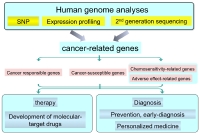Research Contents
We have been studying on the following major projects;
Characterization and identification of novel molecular-targets for the diagnosis and treatment of human cancers
- To identify novel molecular-targets for the diagnosis and treatment of cancer, we have been analyzing the gene expression profiles in breast cancers, renal cell carcinomas and bladder cancers as well as normal human tissues by means of DNA microarray. Through these microarray data, we have identified several candidate genes that are overexpressed in cancer cells and not expressed in normal human organs, especially vital organs, as novel molecular targets for therapeutic drugs (chemical compounds, antibody drugs or RNAi drugs).
Fig.1 Study strategy in our laboratory

Development of strategies for better diagnosis, effective treatment and prevention oh human cancer on the basis of human genome analysis.
- Breast cancer-related oncoproteins
- BCGT1(Breast cancer-related glycosyltransferase 1)
- Breast cancer is the most common malignancy in women. To identify novel molecular targets for breast cancer therapy, we analyzed genome-wide gene expression profiles of breast cancer specimens, and identified on breast cancer glycosyltransferase 1 (BCGT1), which is upregulated in a great majority of breast cancers, as a druggable target for breast cancer therapy. Semi-quantitative RT-PCR and Northern blot analyses confirmed BCGT1 overexpression in breast cancer specimens and/or breast cancer cell lines, but undetectable expression in normal human tissues. Knockdown of BCGT1 expression by short-hairpin RNAs (shRNAs) significantly suppressed the cell growth of breast cancer cells. Concordantly, overexpression of BCGT1 into NIH-3T3 cells significantly enhanced cell growth. These results suggest that BCGT1might contribute to mammary carcinogenesis and might be a promising novel therapeutic target for the treatment of breast cancer.
- Renal cell carcinoma-related molecules
RCCRH (renal cell carcinoma related helicase)
- Though the expression profiling analyses of renal cell carcinoma specimens, we identifed RCCRH (renal cell carcinoma related helicase) as a novel target of clear renal cell carcinoma therapy. Semiquantitative RT-PCR and northern blot analysis confirmed the up-regulation of RCCRH in clear renal cell carcinomas, and its undetectable level of expression in normal human tissues. Depletion of RCCRH expression by vector-based RNA interference significantly suppressed the growth of clear renal cell carcinoma cell lines. Depletion of RCCRH expression by vector-based RNA interference significantly suppressed the growth of clear renal cell carcinoma cell lines. Concordantly, RCCRH expression significantly enhanced cellular growth, implying RCCRH to have an oncogenic activity. Targeting the RCCRH molecule might have the potential to help us develop a new therapeutic strategy for management of clear renal cell carcinoma.
Investigation of mechanisms underlying triple-negative breast cancer (ER-negative, PgR-negative and Her2-negative)
- Triple-negative breast cancers (TNBC) are defined by a lack of estrogen, progesterone, and Her2 receptors. TNBC has distinct clinical and pathologic features, and is a clinical problem because of its relatively poor prognosis, aggressive behavior and lack of targeted therapies, leaving chemotherapy as the mainstay of treatment. We are aiming at understanding molecular mechanism of TNBC carcinogenesis, and identifying therapeutic-targets for effective treatment of TNBC.
 Japanese
Japanese
 前のページへ
前のページへ